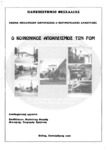Public’s perceptions of urban identity of Thessaloniki, Greece
Ημερομηνία
2022Γλώσσα
en
Λέξη-κλειδί
Επιτομή
Urban identity (UI) is a multi-faceted concept that encompasses different aspects of urban environment, built heritage and natural environment and is also related to important properties of the cities. The paper studies the associations between the inhabitants’ perceptions of UI and their socio-demographic profile. The city of Thessaloniki is the case study of this research. The research was based on data collection via structured questionnaires, and the results were statistically analyzed using: descriptive statistics, χ2 analysis, crosstabs method, regression analysis and discriminant analysis. The results show that UI, being a generally unknown term to the public, incorporates the notions of history and culture, urban environment, social behavior and everyday life, and it is influenced by social and economic factors. The perceptions on the city’s identity are associated with gender, age and family status, as well as the way people spend their spare time. It emerges that, in Thessaloniki, a policy mix is necessary to preserve and upgrade the historical assets of the city, along with the improvement of its every day functions. © 2021, The Author(s), under exclusive licence to Springer Nature Limited.
Collections
Related items
Showing items related by title, author, creator and subject.
-
Peri-urban and urban forests in Greece: Obstacle or advantage to urban development?
Christopoulou, O.; Polyzos, S.; Minetos, D. (2007)Purpose - The purpose of this paper is to investigate the importance of peri-urban forests to the process of urban growth. The article aims at providing a brief description of peri-urban forests' contribution to the ... -
Urban design, urban space morphology, urban tourism: An emerging new paradigm concerning their relationship
Gospodini, A. (2001)The paper concerns the relationships between the physical form of the urban environment and leisure activities. It examines how urban space morphology-i.e. spatial patterns and formal patterns-may have an impact on tourists' ...


